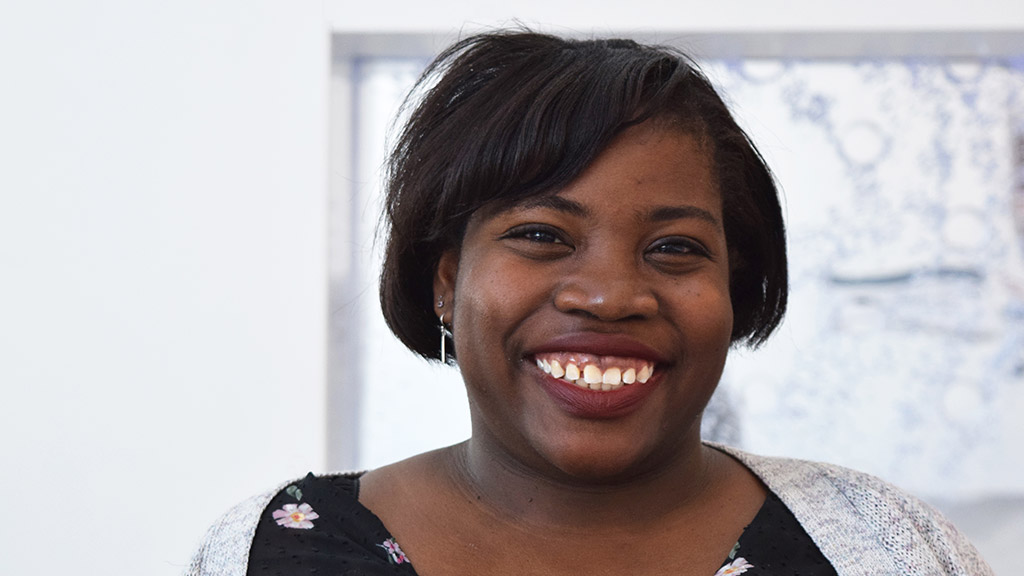Striking a balance: Stecia-Marie Fletcher finds harmony in music amid PhD demands
Within Sunnybrook Research Institute (SRI), Stecia-Marie Fletcher is likely best known for her work in the lab of Dr. Meaghan O’Reilly, a scientist in Physical Sciences. “We’re looking at using focused ultrasound to enhance the permeability of the blood-spinal cord barrier so that we can deliver drugs,” says Fletcher, a PhD student. To members of the broader Sunnybrook community, it’s the hospital’s holiday gatherings with which they might associate Fletcher. In December 2018, she entertained the crowd in McLaughlin auditorium as part of the Sunnybrook band with her rendition of Sade’s “Smooth Operator,” among other tunes.
Music has played a role in Fletcher’s life since her parents introduced her to the piano as a four-year-old in her home country of Trinidad and Tobago. Her passion evolved, and she was taking voice-training lessons by 13 years, the age at which she first performed on stage. She vividly recalls the occasion: “It was the best feeling; a high. That’s when I realized, ‘This is something I’m good at, and it’s something I really enjoy.’ I wanted to sing forever.” She admits it was a misstep to let music slip during her undergrad, which she completed at University College London in London, U.K., but she has rekindled her relationship with it and relies on it to offset her PhD stressors. Aside from the Sunnybrook band, she sings with a choir twice a week and at a church at least once every weekend, and she takes on wedding gigs.
Here, Fletcher discusses with Matthew Pariselli how music factors into her life, how it benefits her research and why having an interest outside of one’s PhD project is paramount.
What is the function of music in your life?
It keeps me sane. That’s the biggest thing. In general, music as a whole calms me down. It makes anything that’s not going well seem easier to bear. If I’m listening, playing or performing music, it gives me an outlet to get rid of very strong emotions.
How have you found a balance between music and your PhD?
I was starting a new chapter of my life by moving to Toronto, and it was really important to me that I had a fulfilling life—a life that felt whole and not just focused on one thing. Music is something that I really love. When I do it, I feel like it’s where I’m supposed to be and it’s what I’m supposed to be doing. It makes me feel very relaxed. When I’m performing and in the zone, it’s almost addictive. I enjoy research and I really like what I do, but sometimes you get to a point where you want to pull your hair out. If I’m having a really bad day at Sunnybrook, I go home, I have my piano, and I think, ‘Yes, this is what I’m doing tonight for a couple of hours.’ Then I’ll feel better and be refreshed when I go back the next day.
How would your PhD be affected if you didn’t have music?
I would be very stressed out all the time. I would be deeply unhappy. I don’t like feeling boxed in, and I think I would feel boxed in. I don’t think I’d do as well in my research. Something important that I’ve realized about research is that it’s not beneficial to think about it all the time because sometimes it’s when you step away from a problem and look at it from a different perspective that you’re able to find the answer you’re looking for, or at least get closer to it. I’ve often found that taking a weekend off where I go to different singing things or do a show, that when I come back I’m better able to focus on my project. I don’t think I would be as good a researcher or grad student if I did not have other things to think about.
For someone beginning their PhD, would you recommend finding an outlet?
I would definitely recommend it. The most important thing I’m doing in my life is getting my PhD. You need to make sure you keep your PhD as your priority, but that you have other outlets. I think if someone just starting their grad program came to me and said, ‘Oh, grad school seems so hard; I shouldn’t be doing anything else,’ I would tell them, ‘No. Learn how to manage your time. Make sure you get everything done for grad school, because it’s a huge undertaking, but make sure you do things that make you happy because grad school will not make you happy all the time. It’s hard, and it’s very stressful. Things go wrong in research, but make sure you have something else that will help you to calm down and that you can use as an outlet. That’s really important.’
Is there anything else you’d like to add?
Music connects people across cultures. I feel like music is magic—it’s very powerful. There’s this thing that I say: ‘For the man who has never heard a note of a sweet song, my heart goes out to him.’ It’s a lyric I wrote in a song. If you’ve never known music, you’ve never known joy or peace. I can’t imagine a world without music. I feel like that would be so depressing. I don’t know who came up with music, but thank you [laughs].



